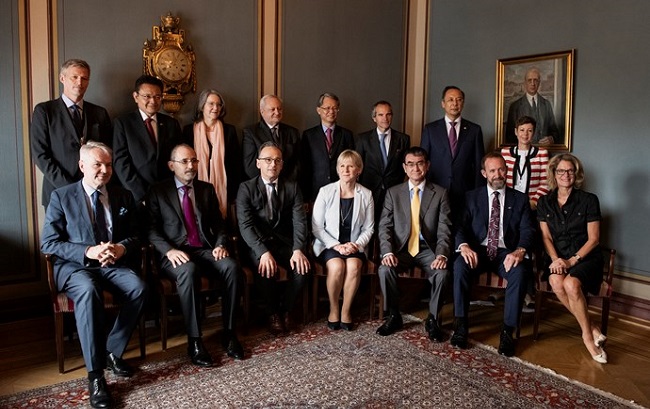Sweden: Ministerial meeting on nuclear disarmament

Participants of the Stockholm Ministerial Meeting on Nuclear Disarmament and the Non-Proliferation Treaty on 11 June, 2019.
Photo: Sofia Nahringbauer / Government Offices of Sweden
We, the participating states – Argentina, Canada, Finland, Ethiopia, Germany, Indonesia, Japan, Jordan, Kazakhstan, Netherlands, Norway, New Zealand, Republic of Korea, Spain, Sweden and Switzerland – to the Stockholm Ministerial Meeting on Nuclear Disarmament and the Non-Proliferation Treaty (NPT), met today to discuss how nuclear disarmament can be advanced.
We are one year away from the 50th anniversary of the Non-Proliferation Treaty, the cornerstone of the global nuclear disarmament and non-proliferation regime. The treaty has been undisputedly successful in preventing the spread of nuclear weapons, laying the foundation for significant reductions in nuclear arsenals and facilitating the use of nuclear energy for peaceful purposes. It has also established an international safeguards system and fostered the creation of nuclear-weapon free zones. Notwithstanding those successes, the role of nuclear weapons has been increasing recently against the background of a deteriorating international security environment.
Qualitatively new capabilities are being developed, spurred on by new technology. The gradual downward trend of the global nuclear arsenal, from its peak in 1986, should not be reversed. A potential nuclear arms race – which would serve no one’s interest – must be avoided.
Regional proliferation challenges add further complexity to the state of affairs. Our firm objective remains the denuclearization of the DPRK in a complete, verifiable and irreversible manner in accordance with all relevant UNSC resolutions. Meanwhile, the multilaterally endorsed nuclear deal with Iran (JCPOA) – a key achievement of the global non-proliferation regime – is in a precarious state.
We reaffirm our support for the establishment of a zone free of nuclear and other weapons of mass destruction and their delivery systems in the Middle East, in line with the 1995 Resolution and the outcome of the 2010 NPT Review Conference.
With its near universal membership, the NPT has been indispensable for global peace and security for five decades. Together we must ensure the future of this landmark treaty. In less than a year from now, States Parties will gather in New York to review the implementation of the NPT and chart the way forward. The Review Conference offers us an opportunity to deliver upon our collective commitments and, in particular, work towards advancing implementation of the disarmament pillar. We should seize that chance and contribute to breaking the deadlock.
Our governments will do their utmost to this end. From different regions and security contexts, we are united in our belief that constructive political and diplomatic engagement is essential to build the trust necessary for progress towards our shared goals.
The high-level meeting of the UN Security Council on 2 April showed unified and strong support for the NPT, which was further expressed in an agreed press statement.
Emphasising the mutually reinforcing character of the three pillars of the NPT, we stress the necessity of further progress on the disarmament pillar.
Contributing to such efforts will be our focus in the year ahead. Our approach will be ambitious yet realistic. We seek in 2020 an outcome that reaffirms the role of the NPT as the cornerstone of the global disarmament and non-proliferation regime. It should give real meaning to this by identifying stepping stones for the implementation of Article VI of the Treaty, building on the commitments made during a series of Review Conferences, notably in 1995, 2000 and 2010.
Recognising the highly challenging character of the global security environment, our discussions today covered a wide range of issues, including more transparent and responsible declaratory policies, measures to reduce the role of nuclear weapons in doctrines and policies, ways of enhancing transparency and of reducing risks of any use of nuclear weapons, strengthened negative security assurances, work on nuclear disarmament verification and the importance of addressing the production of fissile material.
All these areas offer concrete opportunities to reduce international tensions and improve global security. They could provide us with important stepping stones, as confidence-building measures, that pave the way for further progress in the years to come. In this context, we noted that the extension of the New START would be a key contribution to preserving strategic stability.
Our efforts are also a response to the United Nations Secretary General’s call to bring disarmament and non-proliferation back to the top of the international political agenda.
Moving forward, our governments – building on the Stockholm Meeting on Nuclear Disarmament and the NPT – will be reaching out to the wider NPT community. It will be of particular importance to work with the nuclear weapon states, whose full commitment and constructive engagement will be essential for success in 2020. Our shared goal is a world free of nuclear weapons.
Swedish Government

